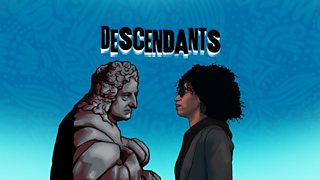What’s it like to live with HIV?
Each week on Tricky, we listen in to four guests discussing important issues in a safe space where nothing is off limits. In this week’s episode of Tricky, four people share their unique experiences of living with HIV. They talk openly and honestly about all aspects of life with the virus, from opening up to friends and family, to the stigmas they have faced and the realities of dating. Here’s what it’s like to live with HIV, from the perspective of Niamh, Jay, Mercy and Kayden.
Listen to Tricky now on 91�ȱ� Sounds
-
![]()
What’s it like to live with HIV?
What is the actual level of information out there about living with HIV; when it comes to new relationships, dealing with the medical profession and handling the stigma?
The language around HIV

The language we use when talking about HIV can be hugely influential on how people perceive both those living with the virus and the virus itself. Kayden, a sex worker, porn performer and sexual and mental wellbeing activist, suggests that phrases like “to be infected” can imply an intentionality behind the contraction of the virus, adding to its stigma. Niamh, who volunteers for the Terrence Higgins Trust, an HIV and sexual health charity, says that recently we have seen a lot of parallels between the language used to describe COVID and HIV. “It’s kind of the same thing: people were infected, or people had a ‘positive result’. It’s quite telling. Language in itself is quite stigmatising.” Jay, a TikTok HIV activist, was recently asked to talk about his experience of being “poz” (HIV positive). He’s not sure how to feel about this descriptor. Niamh likes “poz” as a term, and uses it in reference to herself, because it gives her a sense of ownership. Kayden has a different view: “I feel as though it’s a comfortable word for people to use who aren’t HIV positive, or aren’t comfortable talking about it and don’t necessarily want to engage fully and meaningfully in the conversation.” Mercy, an HIV activist, thinks language can be an important way of ‘owning’ one’s situation. Her chosen vocabulary to describe her status is “living with HIV.”
“Coming out”
Not knowing how others will react to their diagnosis can be a source of real apprehension for people living with HIV. Niamh had witnessed the stigma of other people, which made her reluctant to talk openly.

It was three years before she told people that she had HIV. At the time, she’d been working on a campaign to reduce stigma in the NHS. She recalls thinking: “I’m involved in this project and I haven’t told anybody. This is meant to be reducing stigma and I’m keeping it a secret. I thought ‘this is a nonsense’ and just put it on Facebook.” She received an “encouraging” response and lots of hugs at work the day after her announcement.
“How did you get it?”
After announcing that she was living with HIV, Niamh was met with the “awful” question: “How did you get it?” Mercy’s experience of being met with this question is different from that of Jay, Niamh and Kayden, as she was born with the virus. “It isn’t just my story, actually it’s a family story – and often a family secret. I want to be respectful of the story of my parents, but also own my own story. It’s a stupid question – what business is it of yours?”
She has found that people are more accepting of her than they might be of others who live with HIV on account of the fact she inherited the virus because it “wasn’t [her] fault”. “Within that there’s a stigma. What would people say if I just said that I’d had sex? What does that change?”
"What’s the law?"
What’s the law? Tricky producer Myles clarifies the legal obligations of those living with HIV. In England and Wales you may be culpable of reckless HIV transmission if all of the following apply:
You have sex with someone who didn’t know you had HIV
You suspected or knew you had it at that time
You understood how it’s transmitted
You had sex without a condom
And you transmitted HIV to that person
If you take precautions to protect your partner from HIV by using a condom or ensuring that your viral load is undetectable, prosecution for reckless transmission is very unlikely. There are very effective treatments and tests available nowadays for HIV. When taken correctly, this can result in sustained, undetectable levels of the HIV virus, and taking these precautions is considered reasonable action when trying to prevent its transmission. The idea, explains Kayden, is that U equals U: undetectable equals untransmittable. The law is stricter in Scotland, and you may be prosecuted if you put someone at risk without their prior knowledge or consent, even if the virus was not transmitted.

Navigating relationships
Kayden thinks it is important to be up front about being HIV positive with people you are dating. He has experienced painful rejection as a result of telling partners about his HIV status at a later stage in their relationship. He has found that people have been unsympathetic about this happening, saying that he “deserved” it for not being up front. “It reaffirms this narrative that I deserve to be alone because of my status.”
When I became public I realised that’s not my weight to bear.Jay
Niamh’s situation is different, however. She lives in Scotland, where you do have to disclose your HIV status to a partner by law. She recalls dating a man who was HIV negative. After three dates she decided to make him aware of her HIV status. She did this in a public space out of fear for how he may react to the news, particularly in case he responded violently. Thankfully, this didn’t happen. “He was grand. He was kind of clued up and it didn’t bother him.” Mercy empathises with Niamh’s decision as gender-based violence is a particular issue for women living with HIV. Jay acknowledges that as a man he wouldn’t even have considered that a partner may react violently. His biggest concern was with disclosing his HIV status to his friends in rural Yorkshire. Before going public with his status, he introspected a lot about what others would think. “When I became public I realised that’s not my weight to bear, if someone’s not attracted to me because I’ve got HIV. That doesn’t say anything about me, that says [some]thing about them.”
The H in HIV
Jay, Mercy, Kayden and Niamh still receive surprising responses to their HIV status. Jay is surprised by how many people he encounters who are also living with HIV. Some people are ignorant about the condition and others are more knowledgeable and understanding than expected. Niamh has a poignant outlook on living with HIV, and reminds others: “The H in HIV stands for human. Treat us with respect.”
You can listen to the full episode of Tricky here and can use the hashtag #91�ȱ�tricky to join in the discussion on social media.
-
![]()
Limelight: The System
The Limelight podcast - for fiction and drama serials you won’t want to miss from Radio 4. First up, The System - a witty six-part thriller.
-
![]()
Sneakernomics
The story of the mavericks and dreamers who battled to create the world's biggest sports brand. Written and presented by Nicholas Smith, with 1Xtra presenter Ace.
-
![]()
I'm Sorry I Haven't A Clue promo box
The long-running, self-styled antidote to panel games.
-
![]()
The Descendants
Descendants looks into our lives and our pasts and asks how we are connected to slavery. And, in turn, who does that mean our lives are connected to?





